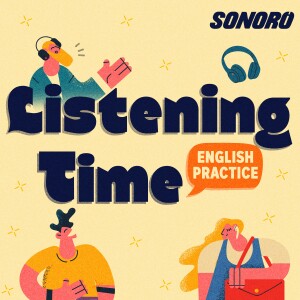⭐ Download FREE lesson PDF: https://espressoenglish.lpages.co/free-pdf-state-verbs-action-verbs/
⭐ Advanced Grammar Course: https://www.espressoenglish.net/advanced-english-grammar-course/
Did you know that we have two types of verbs in English?
They are action verbs (or dynamic verbs) and state verbs (also called “stative verbs” or “state of being verbs”).
There are even some verbs that can be BOTH action verbs and stative verbs, depending on the use and context! We’ve also got some special grammar rules about state verbs, and today you’ll learn all about them.
I’ve made the lesson guide available for you to download for free - just click here and enter your e-mail address to receive that free PDF download.
Hope that helps you understand the difference between action verbs and stative verbs, as well as how we use them!
If you want to understand and really master English grammar so that you can use it successfully without thinking too much about all these rules, come join my Advanced English grammar course.
What’s great about this course is that not only will you learn grammar, but I’ll also help you put it into practice and use it yourself. It will help take your English language skills from “good” to GREAT!
⭐ Download FREE lesson PDF: https://espressoenglish.lpages.co/free-pdf-state-verbs-action-verbs/
⭐ Advanced Grammar Course: https://www.espressoenglish.net/advanced-english-grammar-course/
More Episodes
Don't say "I'm going to U.S.A."!
 2023-10-11
2023-10-11
TO vs. TOO: Difference + Examples
 2023-10-06
2023-10-06
40 Vocabulary Words Inside the Human Body
 2023-10-04
2023-10-04
Feeling + Feelings Collocations
 2023-09-27
2023-09-27
Than vs. Then + 10 Common Expressions
 2023-09-20
2023-09-20
How to end conversations (without being rude)
 2023-09-14
2023-09-14
How to keep a conversation going (with examples!)
 2023-09-13
2023-09-13
40 phrases for starting conversations in English
 2023-09-12
2023-09-12
Reported Speech: Rules, Examples, and Exceptions!
 2023-09-06
2023-09-06
When do we use ANYMORE vs. ANY MORE?
 2023-08-31
2023-08-31
Which is correct: A historic event or AN historic event?
 2023-08-30
2023-08-30
Which is correct: IN school or AT school?
 2023-08-29
2023-08-29
Difference between SEE a movie and WATCH a movie?
 2023-08-28
2023-08-28
Everybody IS or everybody ARE?
 2023-08-27
2023-08-27
When to use HAVEN'T vs. DON'T HAVE?
 2023-08-26
2023-08-26
Do we get ON a bus or get IN a bus?
 2023-08-25
2023-08-25
What does AIN'T mean, and when do we use it?
 2023-08-24
2023-08-24
"Have a good look" or "Be good-looking"?
 2023-08-23
2023-08-23
Speak WITH or Speak TO?
 2023-08-22
2023-08-22
SHOULD vs. SUPPOSED TO?
 2023-08-21
2023-08-21
Create your
podcast in
minutes
- Full-featured podcast site
- Unlimited storage and bandwidth
- Comprehensive podcast stats
- Distribute to Apple Podcasts, Spotify, and more
- Make money with your podcast
It is Free
You may also like

Learn French with Anthony


Explore France with Anthony


All Ears English Podcast


Listening Time: English Practice


Speak English with ESLPod.com - Learn English Fast

- Privacy Policy
- Cookie Policy
- Terms of Use
- Consent Preferences
- Copyright © 2015-2024 Podbean.com




 iOS
iOS Android
Android